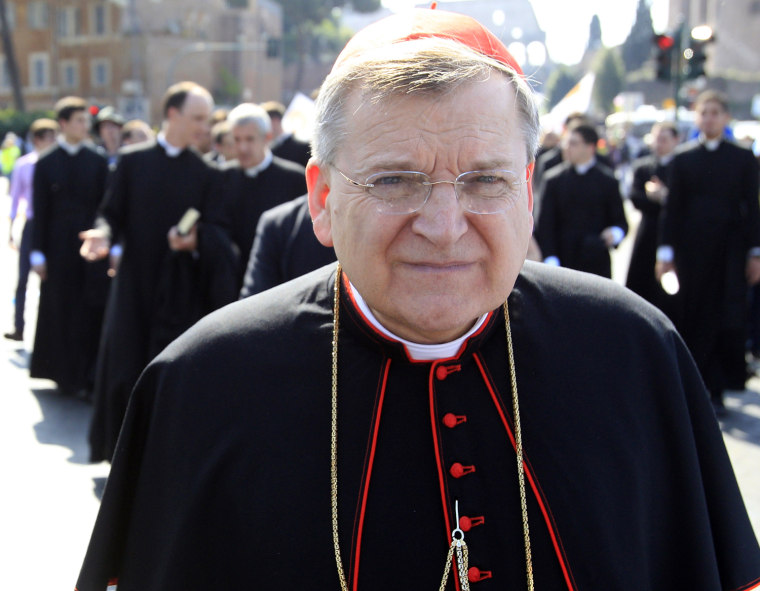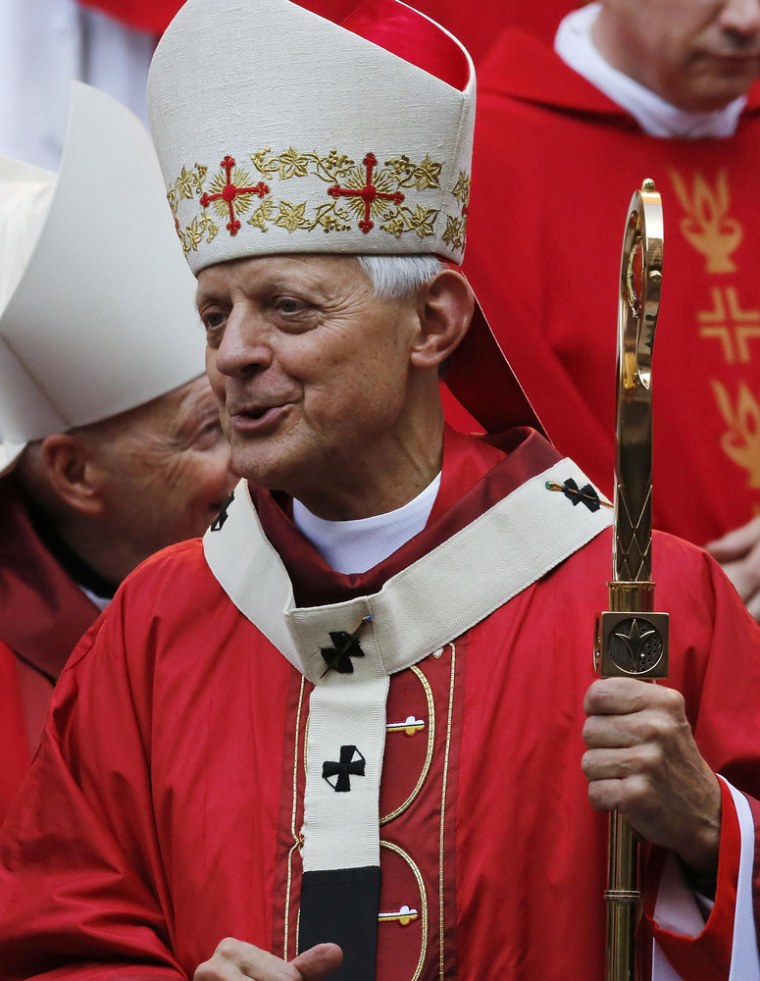
Four years ago, the former archbishop of St. Louis, Raymond Burke, was caught on tape saying that the head of the Washington archdiocese, Donald Wuerl, and other moderates were "weakening the faith" by refusing to ban pro-choice politicians from receiving communion.
Burke had to apologize for the remark, but it didn't diminish his profile in Rome under former Pope Benedict, who had appointed him head of the Vatican's equivalent of the supreme court and given him a coveted spot in the influential Congregation of Bishops.
Now, there's a new pontiff in town.
Pope Francis this week shook up the bishops panel, replacing the conservative Burke, now a cardinal, with none other than the moderate Wuerl, also a cardinal, in a move that could have a far-reaching effect on church leadership.

"This is one of the most significant moves so far," the Rev. Thomas Reese, author of "Inside the Vatican: The Politics and Organization of the Catholic Church," said of Monday's big announcement.
"This is a clear signal of change among the bishops."
Dr. Michael Higgins of Sacred Heart University in Fairfield, Conn., agreed, saying, "I think we're seeing the beginning of more radical reforms."
Francis, the former archbishop of Buenos Aires, has made it clear that he is taking a more pastoral approach to the papacy with less of a focus on hot-button issues like abortion and gay marriage.
Just this month, in a television interview, Burke made it equally clear that those issues remain a priority for him. "We can never talk enough about that," he said.
Jaime Allman, Burke's chief spokesman when he headed the St. Louis archdiocese, said he worries that the church is being "cleansed" of opposing views.
“I think the pope is under a lot of pressure from certain people to quiet individuals who are perceived to be more focused on the orthodoxy, the tougher line than the softer line, and that’s Cardinal Burke," Allman told NBC News.
“There is some perceived effort that somehow the more activist members of the Catholic Church somehow need to be removed from influence."
The Congregation of Bishops oversees the selection of bishops around the world, giving its recommendations to the pope, who ultimately makes the call.
Higgins noted that Francis did not boot Cardinal Marc Ouellet of Canada, the Benedict confidante who heads the congregation and was seen as a papal contender during the last conclave.
"He doesn’t want to do a scorched earth policy," said Higgins. "It's more like, 'These are the people I can work with and these are the people who can temper the conservative influence.'"
By global standards, Wuerl — along with the rest of the U.S. bishops and cardinals — leans more conservative than many of his counterparts around the world, Higgins said.
But there is no question that Burke draws the harder line on divisive issues like contraception, abortion and embryonic research — the very type of topics that Pope Francis has complained are an obsession among some church leaders.
In recent years, Burke has banished a nun who spoke out for the ordination of women, resigned from the board of a hospital that hosted pro-choice singer Sheryl Crow at a fund-raiser, referred to President Obama as an "agent of death," and repeatedly called for clergy to deny communion to public figures who support abortion rights.
Wuerl is less scolding and has steadfastly opposed from-the-top bans on the sacraments for lawmakers whose political views diverge from church teaching.
"Incrimination of others has become a hallmark among some groups and individuals in the Catholic Church in our country today," Wuerl wrote in a 2009 editorial titled "Casting the First Stone" that reads like Pope Francis could have penned it.
Burke has not been completely cast from the Vatican hierarchy; he's keeping his job as Prefect of the Supreme Tribunal of the Apostolic Signatura — for now, anyway.
But as a member of the Congregation of Bishops, Wuerl will have a say in which bishops lead the church into the future. Reese noted that the Archdiocese of Chicago — the third largest in the U.S. — will soon have a vacancy when Cardinal Francis George reaches mandatory retirement age of 75.
In Burke's old stomping ground, one parish priest said the swap should not come as a surprise.
"Obviously, Pope Francis is putting people on there that have a vision like his own. I think it's very pastoral," said the Rev. Rick Potts, pastor at St. Alphonsus "Rock" church.
"He desires to be more merciful, more compassionate and more pastoral. He's picking bishops who share that vision and desire."
Related: